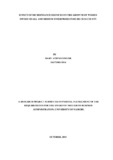| dc.description.abstract | Women in developing economies are the highest contributors towards economic growth through
the economic activities they engage in. The failure of most of these women entrepreneurs especially
I in the rural and semi- urban areas is largely due to the inability to fully exploit the Microfinance
Institution services offered to them. The objective of the study was to establish the effect of micro
finance services on the growth of women owned small and medium enterprises in Ruiru Sub
County. To achieve this objective, the study focused on three MFI services including Micro credit,
Business Management Training and Group savings. Each variable was analyzed to determine its
effect on the growth of SMEs which was measured in terms of percentage growth in sales. The
study adopted descriptive research approach and targeted a population of 467 women owned SMEs
in Ruiru Sub County. A random sample of 47 SMEs was taken, being the 10% as recommended in
Mugenda and Mugenda. Questionnaires were sent and the dully filled and returned ones were
analyzed using spss computer software package. Regression and correlation analysis was done. The
study established that women needed collaterals to qualify for micro credit facilities, while loan
application procedures were long and interest rates on micro loans were high. The study also
established that business training services were offered to a very small extent, attendance was not
regular and there was no follow up on implementation advisory services offered during such
training. The study also established the women SME owners highly engage in group savings, that
level of group savings influence the amount of micro credit given. The study also revealed that
there was a strong positive correlation between group savings and growth of women owned SMEs,
while there was a weak correlation between micro credit and growth of women owned SMEs and
also a weak correlation between training and growth of women owned SMEs in Ruiru Sub County.
The study recommended that; Microcredit should be tailored to meet specific needs of women
owned SMEs so s to accept alternative collaterals and interest rate be designed to be friendly. The
study also recommended that Business Management training hours be increased and regular follow
up on implementation by SME trainees be made and closely monitored. Group savings should also
be encouraged to improve group synergy. In summary, it was noted that most 32 (68%) of the
female entrepreneurs were of the view that micro credit services were valuable, but conditions for
obtaining microcredit were restrictive. They also agreed that a greater portion of their training needs
are not met by MFI services due to few hours of training and lack of follow up. They agreed that
group savings is a key tool in spearheading business growth. | en_US |

